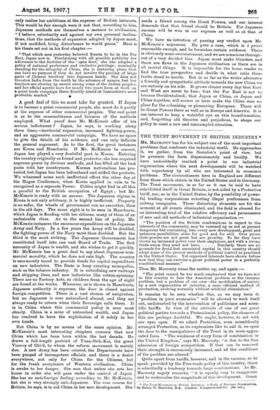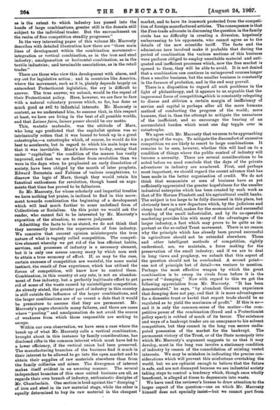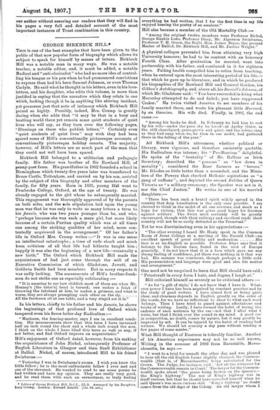THE TRUST MOVEMENT IN BRITISH INDUSTRY.*
Ma. Disown,/ has for his subject one of the most important problems that confronts the industrial world. He approaches
it, we gather, from the Socialist's point of view, but he presents the facts dispassionately and lucidly. We have undoubtedly reached a point in our industrial organisation where the next developments will be watched with expectancy by all who are interested in economic problems. The circumstances here in England are different from those which obtain in the United States and in Germany. The Trust movement, in so far as it can be said to have established itself in Great Britain, is not aided by a Protective tariff, nor, as in the United States, by the possibility of power- ful trading corporations extorting illegal preferences from railway companies. These disturbing elements are for the moment at all events eliminated, and the field is cleared for an interesting trial of the relative efficiency and permanence of new and old methods of industrial organisation :—
" The position of the British combinations in regard to the interests of the community may be summed up as not at present dangerous but containing, like every new development, great and unknown possibilities alike for good and for evil. Over prices their powers are not great but are growing. So far they have shown no increased power over their employees, and with a strong trade union they need not have Similarly there are no grounds for dread lest associated capital in this country should adopt some of the grosser methods of political control as practised in the United States. Yet organised interests have shown before now that they can exercise a great political power in a perfectly constitutional manner?'
Thus Mr. Macrosty sums the matter up, and again :— " The point cannot be too much emphasised that we have not in this country to face the American problem or the German problem, but a problem of our own—the modification of society by a new organisation of industry, a more efficient method of production, evolving normally without artificial stimulation."
It remains to be seen whether this, as we may term it, "problem in pure economics" will be allowed to work itself out, undisturbed by the intervention of politicians and scien- tific tariffs. In view of the attitude of one of our great political parties towards a Protectionist policy, the chances of this are perhaps doubtful. We ought, however, to aot with our eyes open. If we admit Protection, even scientifically arranged Protection, as its euphemists like to call it, we open the door to the manipulators of the Trust in its more aggra- vated form. " The weakness of every form of combination in the United Kingdom," says Mr. Macrosty, "is due to the free
admission of foreign competition. If that can be removed their strength is enormously increased, and all the conditions
of the problem are altered." Quite apart from tariffs, however, and in the vacuum, so to
speak, provided by the Free-trade policy of this country, there is admittedly a tendency towards large combinations. As Mr. Macrosty sagely remarks, " it is equally easy to exaggerate and to undervalue the magnitude of this development. Great • The Trust Atonement in British Industry : a Study of Business orgasiaatios. By Henry W. Macrosty, B.A. London: Longman. and Co. [ss. net.]
as is the extent to which industry has passed into the hands of large combinations, greater still is the domain still subject to the individual trader. But the encroachment on the realm of free competition steadily progresses."
In the very interesting pages of this volume Mr. Macrosty describes with detailed illustration how there are "three main lines of development within the combination movement— integration or vertical combination, as in the iron and steel industry; amalgamation or horizontal combination, as in the textile industries; and terminable associations, as in the retail trades."
There are those who view this development with alarm, and cry out for legislative action ; and in countries like America, where the movement, such as it is, plainly depends largely on antecedent Protectionist legislation, the cry is difficult to answer. The true answer, we submit, would be the repeal of their Protectionist policy. Here, however, we are face to face with a natural voluntary process which, so far, has done as much good as evil to industrial interests. Mr. Macrosty is content, as we understand him, to assume that, in this respect at least, we here are living in the best of all .possible worlds, and that Laissez faire, laissez passer should be our motto.
This, mutatis mutandis, was the attitude of Marx, who long ago predicted that the capitalist system was so intrinsically rotten that it was bound to break up in a great catastrophe,—a catastrophe which, of course, he would do his best to accelerate, but in regard to which his main hope was that it was inevitable. Marx's followers to-day, seeing that under "capitalism" the condition of the masses has vastly improved, and that we are farther from revolution than we were in the days when be prophesied an early dissolution of society, have been obliged by the mouth of later prophets, Edward Bernstein and Fabians of various complexions, to disavow the logic of Marx, though they would retain his fanatical enthusiasm for revolution, though based on argu- ments that time has proved to be fallacious.
So Mr. Macrosty, for whose scholarly and impartial treatise we have nothing but praise, is inclined to find in this move- ment towards combination the beginning of a development which will lead much further to some undefined form of Collectivism or Socialism. On this point we would ask the reader, who cannot fail to be interested by Mr. Macrosty's exposition of the situation, to reserve judgment.
Admitting the facts to be as stated, we do not think that they necessarily involve the supersession of free industry. We conceive that current opinion misinterprets the true nature of what is vaguely called competition. The competi- tive element whereby we get rid of the less efficient habits, services, and processes of industry is a necessary element, but it is only one means among many by which men seek to attain a true economy of effort. If, as may be the case, certain excesses of competition are wasteful, the same social instinct, the result of free experience, which has utilised the forces of competition, will know how to control them. Combination, in this country at any rate, is not an abandon- ment of free industry, but a perfectly legitimate effort to get rid of some of the waste caused by unintelligent competition. As already stated, the greater part of industry in this country is still outside the influence of the larger combinations, and the larger combinations are of so recent a date that it would be premature to assume that they are permanent. Mr. Macrosty's pages chronicle many failures, and there are cases where " pooling " and amalgamation do not avoid the source of weakness from which those responsible are seeking to escape.
Within our own observation, we have seen a case where the break up of what Mr. Macrosty calls a vertical combination, brought about in this instance by family considerations, has disclosed rifts in the common interest which must have led to a lower efficiency, if the vertical union had been preserved. The manufacturing branches of the business find it much in their interest to be allowed to go into the open market and to
obtain their supplies of raw materials elsewhere than from the family collieries and mines. The divergence of interest
makes itself evident in an amusing manner. The several independent branches of this once united business are all, as regards their own branch of industry, enthusiastic disciples of
Mr. Chamberlain. One section is loud against the " dumping " of iron and steel in its raw material stage, while the other is equally determined to buy its raw material in the cheapest
market, and to have its ironwork protected from the competi- tion of foreign manufactured articles. The consequence is that the Free-trade advocate in discussing the question in the family circle has no difficulty in creating a diversion, hopelessly embarrassing to his opponents, who cannot agree as to the details of the new scientific tariff. The facts and the admissions here involved make it probable that during the period of combination the various sections of this business were perforce obliged to employ unsuitable material and anti- quated and inefficient processes which, now the free market is opened to them, they will be able to avoid. It is not denied that a combination can continue in unimproved courses longer than a smaller business, but the smaller business is constantly in the furnace of probation, and in the end may prevail.
There is a disposition to regard all such problems in the light of philanthropy, and it appears to us arguable that the impersonal force of competition which is constantly relegating to disuse and oblivion a certain margin of inefficiency of service and capital is perhaps after all the more humane method of conducting the progress of the world; more humane, that is, than the attempt to mitigate the uneasiness of the inefficient, and so encourage the bearing of an accumulated burden which must one day topple over in catastrophe.
We agree with Mr. Macrosty that we seem to be approaching a parting of the ways. To mitigate the discomfort of excessive competition we are likely to resort to large combinations. It remains to be seen, however, whether this will lead on to a condition of things where the public control of industry will become a necessity. There are several considerations to be noted before we need conclude that the days of the private adventurer in industry are numbered. First, and perhaps most important, we should regard the recent advance that has been made in the better organisation of credit. We do not think that economists or men of business have as yet sufficiently appreciated the greater hopefulness for the smaller industrial enterprise which has been created by such work as that of Sir Horace Plunkett and his agricultural credit banks. The subject is too large to be fully discussed in this place, but obviously here is a new departure which, by the judicious and cheap loan of capital, makes for the economical and successful working of the small industrialist, and by its co-operative marketing provides him with many of the advantages of the larger industry, a fact which may prove to be quite as im- portant as the so-called Trust movement. There is no reason why the principle which has already been proved successful in agriculture should not be extended elsewhere. These and other intelligent methods of competition, rightly understood, are, we maintain, a force making for the preservation of the small industry; and if we are to deal in long views and prophecy, we submit that this aspect of the question should not be overlooked. A second point— one not of principle but of detail—we venture to mention. Perhaps the most effective weapon by which the great combination is to sweep its rivals from before it is the power of " dumping." Now with regard to this we get the following appreciation from Mr. Macrosty. "It has been demonstrated," be says, "by abundant German experience that dumping does not pay, and that it is more advantageous for a domestic trust or kartel that export trade should be so regulated as to yield the maximum of profit." If this is so— and it is only the common-sense of the matter—the com- petitive power of the combination (fraud and a Protectionist policy apart) is robbed of much of its terror. The existence and ways of a bankrupt trader are an annoyance to his solvent competitors, but they cannot in the long run secure undis- puted possession of the market for the bankrupt. The permanent victory of the Trust, or of the State monopoly into which Mr. Macrosty's argument suggests to us that it may develop, must in the long run involve a stationary condition of industry by reason of the consolidation of existing vested interests. We may be mistaken in indicating the precise con- siderations which will prevent this misfortune overtaking the world, but we are optimist enough to believe that the futire is safe, and are not dismayed because we see industrial society taking steps to control a tendency which, though once wholly beneficent, is alleged at times to degenerate into waste.
We have used the reviewer's license to draw attention to the larger aspect of the question—one on which Mr. Macrosty himself does not specially insist—but we cannot part from our author without assuring our readers that they will find in his pages a very full and detailed account of the most important instances of Trust combination in this country.




































 Previous page
Previous page